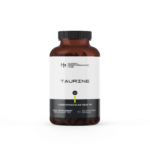In this article, Human Performance Hub deep dives into L-carnitine’s effect on testosterone levels. We’ll cover L-carnitine, how it affects testosterone and the benefits of increased testosterone levels. So, let’s get right into it. Does L-carnitine actually boost testosterone levels?
Yes. L-carnitine is a supplement that has been gaining traction in the fitness community for its potential to increase testosterone levels. This amino acid helps the body produce energy, which means it also plays an important role in metabolism and weight loss. Please bear in mind however that more research is required surrounding the connection between L-carnitine and testosterone. This is because most of the research carried out so far focuses on animals (rats in particular).
Keep reading to learn more about how L-carnitine affects testosterone levels.
Does L-Carnitine Boost Testosterone Levels?
Yes, for low testosterone, research suggests that the amino acid L-carnitine encourages testosterone production, improves testicular function and makes existing testosterone more active. In fact, L-carnitine plays key roles in energy generation and improving blood flow, with major benefits for men’s health.
Propionyl L-carnitine is an amino acid naturally produced in the body. This particular amino acid is essential for the delivery of fatty acids to the mitochondria that fuel energy production in each cell. Whilst there are several types of carnitine, propionyl L-carnitine is the amino acid that boosts production of nitric oxide, which directly parallels increasing testosterone levels. Nitric oxide and testosterone are inextricably linked, higher nitric oxide leads to better testosterone synthesis in a male’s testes.
Unfortunately, an inevitable consequence of ageing is a rapid decline in our cellular energy level. Generally speaking, this often manifests as a sense of overall fatigue, depression and loss of libido. However, taking L-carnitine leads to better carnitine levels within tissues. L-carnitine is responsible for fuelling energy production at the cellular level, whilst enhancing testosterone formation.
Studies Supporting The Claims
Scientific research has started to explore the potential benefits of acetyl L-carnitine for increasing testosterone production. In fact, a study found that men with low testosterone levels who were supplemented with acetyl L-carnitine experienced a 15% increase in testosterone levels. On top of this, acetyl L-carnitine has been shown to improve sperm count and motility in men with fertility issues. It may also enhance exercise performance, which can indirectly lead to higher testosterone levels.
How Does L-Carnitine Boost Testosterone Levels?
L-carnitine encourages optimal testosterone levels in a number of ways, including:
Testosterone Production
It appears to directly stimulate production of testosterone. A recent study showed that serum levels of carnitine were independently associated with free testosterone contractions in men. Consequently, lower levels of carnitine translated into lower testosterone.
Depression
L-carnitine relieves depression, which in turn lowers testosterone levels. Interestingly, both testosterone and L-carnitine lead to equal improvements in mood and energy in a 2004 Italian study.
Hormone Levels
Research indicates that L-carnitine can help restore luteinizing hormone, which in men is a hormone that controls testosterone production. Testosterone is made in Leydig cells in the testes, and carnitine exerts a protective effect on the cells of the testes. The function of the testes depends on sexual hormones such as follicle-stimulating hormone (FSH), luteinizing hormone and testosterone.
Studies have found that in subjects with depressed testicular function, supplementation with L-carnitine enhances the recovery of serum sex hormone levels including luteinizing hormone, with resulting benefits to testosterone production, sperm count, and sperm motility.
Androgen Receptors
L-carnitine improves the number of androgen receptors and their sensitivity to testosterone. Active receptors are necessary to receive and bind testosterone and for the hormone to carry out all of its normal functions. For testosterone to exert any effect on the body, it must first bind to an androgen receptor inside a cell. The attaching of testosterone to its receptors ‘switches on its actions’. In fact, studies have shown that taking 2,000mg daily of an L-carnitine supplement can boost male androgen receptors within 3 weeks.
According to the Italian study mentioned already, L-carnitine supplements can work as effectively as testosterone for male vitality and libido. Taking L-carnitine as propionyl-L carnitine at 2,000mg/day and L-carnitine 2,000mg/day, improved testosterone-related functions including erectile capacity, modestly exceeding the benefit seen with oral dosing of testosterone itself.
To learn more about L-carnitine, take a look at our insightful article, ‘The Benefits of L-Carnitine’.
How To Use L-Carnitine for Testosterone Boosting?
Acetyl L-carnitine is known for its ability to boost testosterone levels, however further research is needed to confirm its effectiveness in this area.
Here are some of our top tips for taking L-carnitine to boost testosterone:
- Consult with a healthcare professional or supplement expert – Before taking any supplements, it’s always best to consult with a healthcare professional or supplement expert.
- Take with food – Acetyl L-carnitine is best taken with food to help improve absorption. For more information, take a look at our article, ‘Can I Take L-Carnitine With Coffee?’
- Determine appropriate dosage – There is no standardised dosage for L-carnitine. The appropriate dosage may vary based on factors such as age, weight and overall health. It’s best to start with a low dose and gradually increase as needed.
- Combine with other supplements – Some supplements such as zinc and magnesium can help enhance the potential testosterone boosting effects of acetyl L-carnitine.
- Patience – Remember to remain patient whilst you are waiting to see results. It may take several weeks or even months of consistent use to see any potential benefits from acetyl. Monitor any changes in your body and overall health.
Understanding L-Carnitine
L-carnitine is a molecule found in the body that is used in numerous bodily processes. It is a combination of two amino acids (Lysine and Methionine) which, when mixed together, create a single compound. L-carnitine plays an important role in the production of energy by transporting fatty acids into your cell’s mitochondria. In turn, the mitochondria act as engines within your cells, burning these fats to create stable energy.
What Is Testosterone?
Generally speaking, as men age, their testosterone levels naturally decline, leading to a variety of health issues such as decreased libido and muscle mass. Testosterone is an essential hormone for male health, responsible for bone density, sexual function and muscle growth. Whilst there are many ways to boost testosterone levels, acetyl L-carnitine has proven to be successful in boosting men’s testosterone levels. Despite this, it’s important to talk to a healthcare professional before starting any supplement regimen.
L-Carnitine Supplements at Human Performance Hub
At Human Performance Hub, we aim to empower people with knowledge, personalised services, and quality supplements to make informed decisions to improve their health. We stock a range of L-carnitine supplements to help support your goals.
If you’re unsure what you’re looking for, please don’t hesitate to get in touch with our experts for more advice on health supplementation.
L-Carnitine FAQs
What Are The Different Types of L-Carnitine?
L-carnitine is the standard biologically active form of carnitine found in your body, foods and most supplements. Here are the different types of carnitine:
- D-carnitine – This inactive form has been shown to reduce blood levels of carnitine and increase fat buildup, leading to liver inflammation and oxidative stress.
- Acetyl L-carnitine – Often referred to as ALCAR, this is probably the most effective form for your brain. Take a look at our quality Acetyl L Carnitine UK Vegetarian Capsules at Human Performance Hub.
- Propionyl L-carnitine – This form is well suited for circulatory issues, such as peripheral vascular disease and high blood pressure. According to older research, it also boosts the production of nitric oxide, which improves blood flow.
- L-carnitine l-tartrate – This is commonly added to sports supplements due to its rapid absorption rate. It also aids muscle soreness and recovery in exercise.
Generally, acetyl L-carnitine and L-carnitine tend to be the most effective for general use however, you should always pick the form that suits your personal needs.
What Is The Difference Between L-Carnitine and ALCAR?
The different chemistry of carnitine means that it has different effects on the body. L-carnitine is good for fat loss and exercise performance whereas ALCAR is good for brain and cognitive health.
How Much L-Carnitine Should You Take?
If you are ever unsure about how much L-carnitine to take, consult the instructions on the packaging or speak with your doctor ro functional medicine practitioner. However, as a rule of thumb, most experts suggests the following dosages for different forms of L-carnitine:
- Acetyl-L-Carnitine: 0.6-2.5 g per day
- L-Carnitine L-Tartrate: 1-4 g per day
What Other Benefits Does L-Carnitine Offer?
On top of boosting testosterone levels, there are a number of other benefits associated with the supplement, including:
- Brain Function – L-carnitine is effective in supporting general brain function. Research suggests that the ALCAR form of L-carnitine may help against age-related mental decline.
- Weight/Fat Loss – Whilst research is divided surrounding the effects of L-carnitine on weight loss, in theory, it supports weight loss by producing energy from existing fat stores.
- Exercise Performance – Again, whilst evidence is mixed in relation to L-carnitine’s relationship with exercise performance, it may benefit recovery, stamina, muscle soreness and red blood cell performance.
Heart Health – Some studies indicate that L-carnitine may help to reduce blood pressure and support the inflammatory process associated with heart disease.



